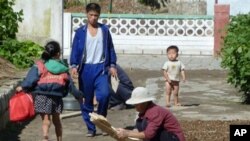Five American aid agencies report the food shortage in North Korea has become severe. They are appealing for quick assistance to feed the isolated country’s most vulnerable people. There are hurdles, however, to resuming aid to North Korea.
The five aid groups say many North Koreans are foraging for wild grasses and herbs because of widespread food shortages.
Seven experts from the groups visited North Korea earlier this month at the request of the government. They were given unprecedented access to assess the food situation, and report the worst winter in decades has killed key crops. At the same time, the team says, rising global food prices make it difficult for North Korea to import sufficient food.
Kim Yong-hyun, a professor of North Korean studies at Donggkuk University in Seoul, says it is unusual for North Korean authorities to allow such transparency.
Kim says officials there have permitted a more objective view of the situation so the global community can know about the depth of the food shortage.
The five organizations are experienced in assisting the isolated state: Christian Friends of Korea, Global Resources Services, Mercy Corps, Samaritan’s Purse and World Vision. But in 2009 they were ordered to leave.
The United Nations’ World Food Program says its supply for North Korea will be exhausted in about a month. WFP staff arrived in the North this week to conduct a fresh assessment of food needs.
The U.S. State Department says Washington is monitoring the situation but is not preparing to resume aid. The U.S. suspended aid two years ago because it suspected the donated food was being diverted to the military or otherwise not reaching those most in need.
Washington and Pyongyang have no diplomatic relations. North and South Korea also have no formal ties and remain technically in a state of war since a 1953 truce that ended three years of conflict.
In previous years, South Korea was the primary source of food for the North, sending hundreds of thousands of tons of rice and fertilizer. Since 2008, however, Seoul’s conservative government has linked aid to the communist state’s efforts to dismantle its nuclear weapons program.
Hundreds of thousands of North Koreans are believed to have died in a famine during the 1990s.
A government agency in Seoul says the average adult man in the North now is about 15 centimeters shorter than average South Koreans.
Humanitarian organizations say children in the North show signs of mental impairment due to a lack of vitamins in their diet.
A South Korean non-profit group, Good Friends, this week said North Korean soldiers no longer receive rice but rather corn, often less than 300 grams a day. It says winter training has been stopped because too many soldiers are malnourished.
The international community has been reluctant to renew assistance to Pyongyang after violent incidents last year. North Korea is blamed for the sinking of a South Korean naval vessel in the Yellow Sea. Pyongyang denies responsibility. The North also shelled a South Korean island, saying it was provoked by a South Korean military exercise.
Aid Agencies Report Severe North Korean Food Shortage
